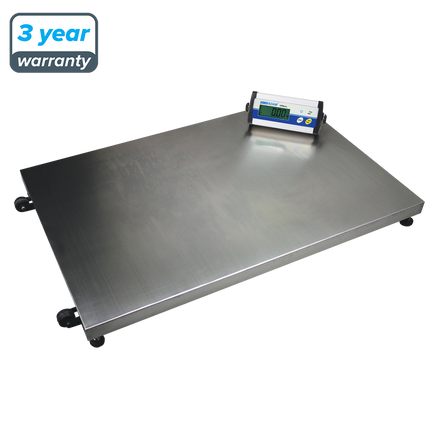
Inscale’s Guide to Dog Weighing
Dog weighing scales are a valuable tool for both pet owners and veterinary surgeons alike. Understanding your pets weight can be crucial for their health and development, as well as giving valuable information on things like correct feeding methods and exercise routines.
This blog looks at all things dog weighing, including how often you should be weighing your pet, as well as featuring some recommendations on which dog weighing scale is right for you.
Why you should know your dog's weight
Knowing your dog’s weight can be a great way to understand the overall wellbeing of your animal. It enables owners to spot any signs of illness that may alter the dog’s weight, such as worms, cancer, digestive issues or Cushing’s disease. It also gives an idea as to whether you are under or over feeding your pet, as well as whether your dog is engaging in the necessary amount of daily exercise.
All of this information allows you to better understand what your dog needs and make sure that your daily dog routine is right for your pet. This could include things like feeding your dog dinner scraps, giving it treats or making sure it has the correct exercise routine to keep if fit and healthy.
How often should you weigh your dog?
How often you weigh your dog is dependent on two main factors: age and health. Generally, if your dog has no existing medical conditions and is fully grown, you expect to weigh your animal every 6 months to 1 year. Normally, a vet will weigh your dog during any checkups, although it is perfectly acceptable for you to weigh your dog yourself more regularly, providing the process does not cause your pet any agitation or stress.
For puppies it’s a different story. For the first six months they should be weighed every 4 weeks to make sure they are developing at the correct rate. If they are not, this could be a sign of medical conditions such as hookworms or roundworms which are transmittable from mother to puppy. Generally, a puppy is expected to gain around 5 – 10% of their body weight every day from the day they are born.
If your dog has a medical condition that causes weight loss, you should be monitoring its weight more regularly. How regularly is dependent on the condition, and we’d recommend talking with your vet to decide how often your pet should be weighed.

How much should my dog weigh?
The subject of average dog weight can be a difficult one, simply because all dogs are different, even if they are the same breed. Just because your dog might be above or below what is considered to be your breeds average weight, does not necessarily mean that it is unhealthy or have a medical condition. There can be even more confusion if your dog is a mixed breed, as this can cause an even greater variation in what might be considered ‘average weight’.
For reference, here are some rough guidelines:
- Toy breeds – Up to 5kg. This includes breeds such as Chihuahuas, Pomeranians or Miniature Yorkshire Terriers.
- Small – 5kg to 12 kg. Includes West Highland Terriers, Italian Greyhounds or French Bulldogs.
- Medium – 12kg – 18kg. Includes Bull Terriers, Whippets or Cocker Spaniels.
- Large – 18kg – 35kg. Includes Pointers, Labradors, Boxers or Golden Retrievers.
- X Large – 35kg and above. Includes Irish Wolfhounds, St. Bernards, Newfoundlands or Great Danes.
To make sure your specific breed is the correct weight, it is always best to talk with your vet.
What dog weighing scales should I use?
Inscale stocks a range of dog weighing scales that can be used at home or in a veterinary surgery. Here’s our pick:

MTB Animal Weighing Scale
The MTB from Adam Equipment is a versatile weighing scale that is perfect for weighing small dogs. It is made from a smooth, comfortable material and features a rubber mat to ensure that the weighing pan remains secure at all times. It also incorporates a hold feature to capture your animal’s weight.

CPWplus Dog Weighing Scale
The Adam Equipment CPWplus is perfect for weighing large dogs up to 200kg, such as Labradors, Golden Retrievers and Alsatians. The large stainless steel weighing pan can be easily wiped down after use and the digital display is easy-to-read and housed in in a robust stainless-steel housing. Dog weighing is made easy with a hold function that is able to capture your dog's weight accurately even they are moving.
For more information about dog weighing or our range of dog weighing scales, please contact us. Our contact number is 01908972660, or Get In Touch.

Leave a comment